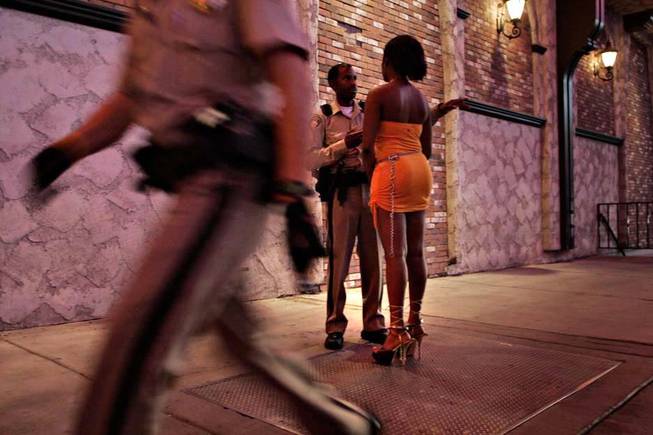
Las Vegas Sun
The Las Vegas Metropolitan Police Department carries out a highly visible arrest saturation targeting prostitution on the Las Vegas Strip late night in June 2006.
Saturday, Sept. 15, 2012 | 2 a.m.
Spend a weekend gambling in Vegas, and losing money is part of the territory; for some, it’s even part of the thrill. But in this tourist-heavy town, hitting the slots and tables aren’t the only risky ways Vegas can separate visitors from their cash. Over the years, conniving criminals have crafted endless ways to scam unsuspecting travelers out of their hard-earned dough. From the oldest tricks in the book to the latest cons, here’s a look at some of the biggest scams, schemes and tricks on the Strip to watch out for:
Follow Andrea Domanick on Twitter at @AndreaDomanick and fan her on Facebook at Facebook.com/AndreaDomanick.
Three card monte
Also known as the shell game, this scheme sounds like a relic of Old Vegas, but it’s alive and kicking on the under-patrolled bridges and sidewalk of the Strip (there are even YouTube videos). On a makeshift table, “dealers” ask players to bet on a card that will be shuffled with two others. If you correctly pick out your card after the shuffle, you double your money.
Sounds simple — except that during the shuffle, the dealer uses sleight of hand to replace your card altogether — making it impossible to win. If you’re looking to gamble, stick to the casinos.
Caught with your pants down
Watch out, ladies: One of the latest schemes sweeping casinos happens where you’d least expect — right in a bathroom stall. Crews of thieves will rush women’s bathrooms, reach over the doors of occupied stalls and grab purses off the door hooks.
"By the time you get off the toilet and make yourself decent to run after them, they’re gone," says Officer Jose Hernandez with Metro’s Public Information Office.
Date-n-ditch
Picture this: You meet an attractive stranger at a bar or club, and you hit it off. He or she claims to have won big at the tables and offers to take you out to an expensive dinner to celebrate. Too good to be true? It usually is: When that charming stranger gets up to use the bathroom at the end of the meal, they don’t plan on coming back — leaving you to foot the exorbitant bill.
John D’oh!
One of the most common scams Hernandez and his colleagues see involves a prostitute conning her john. The client will bring the woman in question up to his room, where she’ll suggest he “go freshen up.” While the john is in the bathroom, the prostitute is cleaning out his pockets, wallets and room, taking whatever she can carry before he returns.
"For the prostitute, there’s never an intent to exchange money for sex. Ninety-nine percent of the time, it’s just to steal from the john,” Hernandez says.
His advice? The obvious. "Don’t bring strangers to your room.”
-

Bucket thieves
This scheme has evolved with gaming technology over the years, but the ploy remains the same: preying on a gambler’s inattentiveness. “Bucket thieves,” as Hernandez calls them, work in teams: One drops some money on the ground and asks a player if it’s theirs. While the player is distracted, a second thief snatches the bucket of coins or tokens they’ve been feeding into the slot machine and runs.
On coinless machines, thieves watch for machines with high credits, press the “cash out” button and run off with the redemption ticket — and perhaps a purse or wallet — while the player is distracted.
"Keep your eyes on your machine, and never let yourself be completely distracted,” Hernandez says.
-
Taxi long-hauling
This summer, the Nevada Taxicab Authority cracked down on drivers for long-hauling, the illegal practice of taking cab riders on circuitous routes to reap a higher fare. Most long-hauling occurs on routes going from McCarran International Airport to the Strip; the Taxicab Authority received numerous complaints from customers who found that their fare upon returning to the airport was $5 to $20 less than what they had been charged on the way there.
While the Taxicab Authority set up a checkpoint at McCarran in June to discourage long-hauling, the best way to avoid getting cheated is to arrive knowing what to expect: refer to a chart on the Taxicab Authority’s website to calculate estimated fares for common taxi trips.
-
Free VIP passes
If there’s one rule of thumb to abide by in the Las Vegas nightlife scene, it’s that you get what you pay for. Strip corners and casino floors are full of promoters offering free VIP passes to just about any nightclub, and while the promise of free drinks or expedited entry may be tempting, these deals are usually too good to be true — less about special treatment than a way to get bodies in the door early in the evening.
Expedited entry usually only applies before the club has reached capacity, before which lines and waiting aren’t much of a hassle anyway. After it’s full, you’re stuck waiting in line or at the mercy of the bouncers — VIP pass or not. The same fine-print ploy goes for promises of free drinks, which are usually limited by amount, quality and time; when a venue promises that “ladies drink free all night!” chances are they mean it literally — until midnight.
The solution: Ask a lot of questions and know exactly what you’re getting into. More legitimate passes won’t promise free entry, but will get you a discount on the cover charge. Never pay for a pass, and tip a promoter at your discretion, as they’re already getting a cut for the night. Watch out for well-dressed promoters sporting ID badges, as some have been known to sell fake passes.



Join the Discussion:
Check this out for a full explanation of our conversion to the LiveFyre commenting system and instructions on how to sign up for an account.
Full comments policy